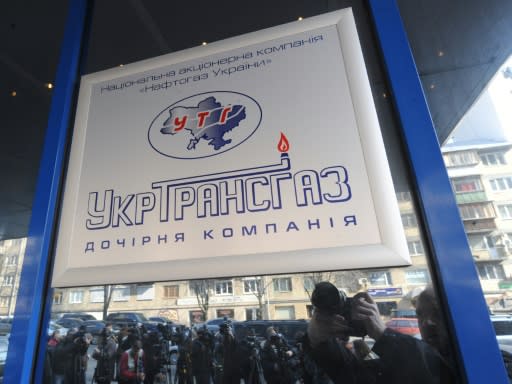After striking murky gas deal, Ukraine bows to West

The scandal was complex but its outcome potentially simple -- Ukraine tried to fiddle with its murky gas sector and upset its EU partners enough to freeze huge sums of financial help.
The fight for control over a profitable company that transports Russia's blue fuel to Europe also exposes the clan warfare and backstabbing that surrounds Ukrainian President Petro Poroshenko and hampers Kiev's bid to anchor its ties to the West.
Ukrtransgaz is the money-making branch of the former Soviet republic's chronically struggling state oil and natural gas company.
It moves about half the gas purchased by Europe from Russia -- or nearly one-tenth of the EU states' needs -- and charges Moscow fees that added up to nearly a billion dollars (euros) last year.
There seemed to be few troubles on its horizon until Ukraine's economy ministry unilaterally decided on September 7 to place the cash cow under its control.
The order sparked an immediate EU outcry because it put both Ukrtransgaz and its parent company in the same ministry's hands.
This violated the European Union's "unbundling" rules that are designed to create competition and split up countries' pipeline networks from their production units.
The timing was especially puzzling because it came just a week before the International Monetary Fund completed a months-long review and granted Ukraine a $1-billion (900-million-euro) loan that had been held up for a year over corruption concerns.
The switch also threatened Poroshenko's bid to apply for EU membership by 2020 and get a $300-million payment from the European Bank for Reconstruction and Development (EBRD) for future gas purchases.
The economy ministry explained that it was putting the two companies under its ownership to avoid a developing conflict between their managers -- and not to skim off Ukrtransgaz's profits to help fill its own expense accounts.
But the EU's Secretariat of the Energy Community warned that Kiev's decision "may force enforcement action... and endanger the role of Ukraine as a transit country."
- West steps in -
The mounting pressure forced Prime Minister Volodymyr Groysman to convene a Monday meeting with the principal players as well as the US ambassador and representatives from the EBRD and the World Bank to assure "all participants about his commitment to energy sector reforms".
"Consequently, an agreement was reached to revoke the (economy ministry's) order," the government said in a statement.
The World Bank's regional director Satu Kahkonen said he "welcomed" the prime minister's decision to cancel the abrupt ownership change of one of Ukraine's best sources of income.
Groysman also vowed Thursday to "speed up the process" of splitting Ukrtransgaz away from its parent under his government's guidance -- something the economy ministry seemed unwilling to do.
A senior EBRD adviser for eastern Europe also hailed the "quick and civilised resolution of these difficult events".
"The Ukrainians understood the situation," the EBRD's Anton Usov told AFP.
"There was a clear understanding of what needed to be done."
- Long-term reputation risk -
Ukraine has been no stranger to government infighting and state graft that has pilfered the budget and cost the current leaders much of the trust that briefly sparked to life in the wake of Ukraine's 2014 pro-EU revolt.
Business magnate Poroshenko rose to power following the historic ouster of Kiev's Moscow-backed president and demanded an immediate reversal of Ukraine's opaque and backroom-dealing course.
But critics accuse the millionaire president of being unable to cut ties from vested interests and take decisive steps that make decision-making transparent and open to public debate.
Some analysts said that Poroshenko's cabinet overhaul in April had done little to break the tradition of the elite spilling blood on the floor for the right to spend state money in one of the poorest corners of Europe.
"This was a clash between the interests of the parties in power for influence and control over financial cash flows," the Ukrainian Academy of Science's energy programme director Valentyn Zemlyanskiy told AFP.
"Ukraine has suffered an enormous loss to its reputation because of this scandal," Zemlyanskiy said. "And this creates risks to its future reputation as well."

 Yahoo Finance
Yahoo Finance 